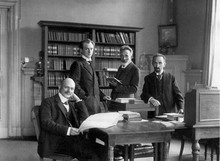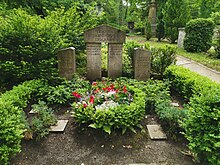Max Hecker


Max Franz Emil Hecker (born April 6, 1870 in Cologne , † April 9, 1948 in Weimar ) was a German philologist , literary historian and archivist . He worked for the Goethe and Schiller Archive in Weimar for 46 years and was involved in the editing of more than 200 publications.
Life
Hecker studied German , English and philosophy in Bonn . His doctoral thesis was for the philosopher Arthur Schopenhauer . The merchant and Schopenhauer lover Stavenhagen, the father of the composer Bernhard Stavenhagen , a pupil of Franz Liszt, became aware of this work . He invited him to Weimar for several weeks, where Hecker also met Bernhard Suphan , the director of the Goethe and Schiller Archives . Suphan offered him to take part in the scientific recording and evaluation of the Goethean legacy in Weimar.
Hecker came to the Goethe and Schiller Archives in Weimar on April 1, 1900 - as a freelancer. This became an activity until the end of life. His restless work for the Sophien edition (later: Weimar edition ) of the Goethe works began with the commentary on Achilles . Hecker's colleagues included Bernhard Suphan and Julius Wahle . From 1924 to 1936 he was also the editor of the Goethe Yearbook of the Goethe Society .
plant
On the occasion of Max Hecker's 70th birthday, Anton Kippenberg , the head of Insel-Verlag , had the bibliography of the jubilee published in a volume called Heac otia fecit (= leisure accomplished this ) - the compilation of all publications from this creative scholarly life comprised more than 200 Publications. Max Hecker also published his “Red Book” after years of work after work: he had evaluated all the newspapers in the city of Weimar that were published between 1775 and 1832 and collected hundreds of notes on the life dates, promotions and fate of those citizens who were contemporaries of Goethe. This resulted in a unique collection of résumés in Weimar during Goethe's time.
Honors
Hecker became a professor at an early age. On May 29, 1920 he was honored with the highest distinction of the Goethe Society Weimar, the Golden Goethe Medal . In 1932 the Italian government invited Max Hecker as one of three Goethe scholars to the inauguration of the “Casa di Goethe”. Hecker is an honorary citizen of the University of Jena .
family
Max Hecker was born with Lili Hecker. Kaiser (1877–1943) married; the couple had three children: Wolfgang, Irma and the writer Jutta Hecker . From 1936 the family lived in the Altenburg in the ground floor apartment (where Bernhard Suphan once lived) opposite the Goethe and Schiller Archives.
literature
- Adalbert Elschenbroich: Hecker, Max Franz Emil. In: New German Biography (NDB). Volume 8, Duncker & Humblot, Berlin 1969, ISBN 3-428-00189-3 , p. 183 f. ( Digitized version ).
- Jutta Hecker: Max Hecker or a life for the Goethe and Schiller Archives. In: Miracle of the Word. Life under the spell of Goethe. Berlin 1989, ISBN 3-373-00322-9 , pp. 82-101.
Individual evidence
- ↑ Jutta Hecker: Bernhard Suphan or The victims in the castles of the spirit. In: Jutta Hecker: Miracle of the word - life under the spell of Goethe. Berlin 1989, ISBN 3-373-00322-9 , p. 43: “... as a freelancer (...); a position which, although it highest fulfillment of life, but no life-long financial security offered. " .
- ↑ DNB 580373967
- ↑ Jutta Hecker: Max Hecker or a life for the Goethe and Schiller Archives. In: Jutta Hecker: Miracle of the Word. Life under the spell of Goethe . Berlin 1989, ISBN 3-373-00322-9 , pp. 82-101.
- ↑ goethe-gesellschaft.de
Web links
- Literature by and about Max Hecker in the catalog of the German National Library
| personal data | |
|---|---|
| SURNAME | Hecker, Max |
| ALTERNATIVE NAMES | Hecker, Max Franz Emil |
| BRIEF DESCRIPTION | German philologist, literary historian and archivist |
| DATE OF BIRTH | April 6, 1870 |
| PLACE OF BIRTH | Cologne |
| DATE OF DEATH | April 9, 1948 |
| Place of death | Weimar |